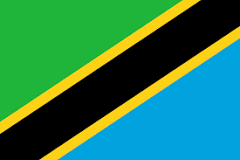Tanzania
Spotlight 28
1. Interview

Hamza S. Johari
Director General
Tanzania CAA

“The SAATM Pilot Implementation Project (PIP) is a wonderful idea by AFCAC, but it needs a true commitment by every Member State of the PIP. All States should “Walk the Talk” to realize the benefits of full liberalization air transport by implementation of YD through SAATM PIP”
1) What have been your achievements in CAA and aviation in your country in 2023 ?
-
- Quick Recovery of air transport services from the COVID-19 Pandemic
The Tanzanian aviation sector saw a significant recovery post pandemic with a number of passengers handled in 2022 surpassing the pre COVID-19, specifically 2019 levels by nearly 2%. The recovery has been so quick and by end of 2023, it reached the level of 21% compared to the 2019 levels. The average annual growth recorded after COVID-19, i.e., between 2020 and 2023, was 35%, compared to 3.8% only that was recorded at least 3 years before COVID-19.
- Installation of modern facilities for communications between Pilots and Aircraft Controllers
2) What are your challenges and how can AFCAC assist you?
- Human Resource Shortage
The sector faces acute shortage of skilled professionals especially Pilots and Aircraft Engineers (both Inspectors and Flying Pilots/Practicing Engineers). This affect the level of regulatory and facilitation aspects of air transport services. AFCAC should mobilize resources for training experts.
- Poor Airport Infrastructures
Many airports/airstrips lack modern facilities and maintenance. This affects safety and efficiency of flight operations into those airports. AFCAC should pool resources for priority airports in Africa.
- Financial Constraints
There is always insufficient funding for both infrastructural development, maintenance and capacity building, which affect the quality of air transport services.
- Connectivity and Network Development
Flight connectivity is inadequate. Current routes can not adequately serve the need of the population and the intended multiplier effect of air transport on other sectors of the Tanzanian economy. This may be addressed by embarking into effective competition including practically implementing SAATM.
3) Your commitment to SAATM: how are you going to proceed with the implementation?
The United Republic of Tanzania has not yet signed the Solemn Commitment for joining SAATM. We are at final stages of consultations with Stakeholders including Policy Makers before we embark into joining the Market. Currently, based on Bilateral Air Services Agreements (BASAs) with 31 African countries, we implement the following YD parameters:
- Free exercise of the 1st, 2nd, 3rd, 4th and 5th Freedom traffic rights for all-cargo. For passengers, free exercise of all freedoms have been allowed in the BASAs except the 5th freedom traffic right which has been allowed on a case-by-case basis;
- Multiple Designation – All BASAs, except 1, which has a double designation provision following a request by the other Part, have specified unlimited designation of eligible airlines;
- Liberalized air tariffs – In the BASAs, tariff provisions are not being regulated; prices are determined by respective forces of demand and supply;
- Unrestricted frequency and capacity – The BASAs have left number of flight frequencies and capacity of aircraft to be deployed, to be determined by the market forces;
- Points of entries – The United Republic of Tanzania allows for all international destinations in Tanzania to be used by the designated airlines of other Parties.
4) What can you say about SAATM PIP?
The SAATM Pilot Implementation Project (PIP) is a wonderful idea by AFCAC, but it needs a true commitment by every Member State of the PIP. All States should “Walk the Talk” to realize the benefits of full liberalization air transport by implementation of YD through SAATM PIP. Further, PIP Members should statistically demonstrate the benefits of SAATM and AFCAC should periodically report to AFCAC Member States, the benefits gained by Members, of full implementation of YD through SAATM PIP. This is a strategy to motivate Members who have not joined SAATM, to do so and those who have joined but not signed the Memorandum of Implementation, to expedite the process.

2. Fact Sheet
3. 5th freedom routes
All routes out of Dar es Salaam, Kilimanjaro and Zanzibar to all international airports of the 31 African States are good for free exercise of the 1st, 2nd, 3rd, 4th and 5th freedom traffic rights. Free exercise of the fifth freedom traffic right for passengers is allowed on the sector Entebbe/Dar es Salaam/Entebbe and Entebbe/Kilimanjaro/Entebbe by Egyptian designated airlines. With Other countries, the BASAs provision on traffic rights, allow exercise of 5th freedom traffic rights for passengers on a case-by-case basis.



